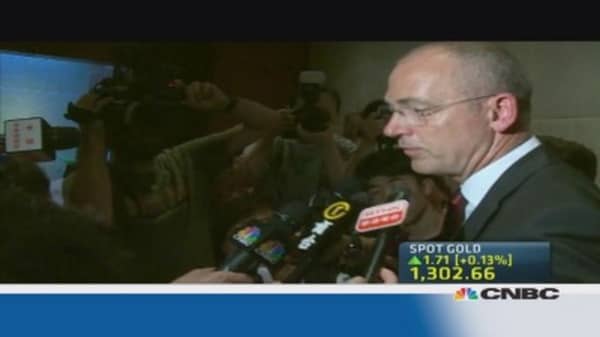Fonterra apologized for the milk powder contamination at a press briefing in Beijing on Monday and said food safety was the firm's top priority. However, the company's share price still fell sharply.
(Read More: China halts milk powder imports from New Zealand, Australia)
"Of course, nobody wants to be in this situation," Fonterra CEO Theo Spierings told CNBC at the briefing. "Sometimes, due to human errors, some things go wrong, and that is what we are trying to correct."
He added that Fonterra should be able to repair its reputation in China, and that its expansion plans there should not be impacted.
"We have to work on the issue first... and then work on what are the next steps to restoring the confidence which, I think should be possible, because we are a big operation which has been there for more than 100 years." Spierings said.
Shares of the company tumbled as much as 9 percent in Asian morning trade, but regained some ground to close down 3.5 percent. The New Zealand dollar was also hit by the food scare, falling to a one-year low of $0.7670.
China's dairy producers, on the other hand, saw their stocks soar on hopes of increased demand after the import ban. Shares of Royal Dairy and Xinjiang Western Husbandry rallied 7 percent and 10 percent respectively.
Analysts told CNBC that the incident will impact New Zealand's dairy trade, worth $9.4 billion annually, and could even hurt the country's overall economic performance.
"It [Fonterra's milk contamination] is a huge issue as far as New Zealand is concerned," said Jeremy Stretch, head of currency strategy at CIBC. "The sheer scale of the company in terms of relative importance particularly for export earnings cannot be understated."
Dairy accounts for about 25 percent of the New Zealand's exports and generates more than 7 percent of the country's gross domestic product (GDP).
(Read More: World's biggest dairy exporter issues botulism alert)
Beyond the immediate impact on demand, industry watchers also flagged longer-term concerns, especially how the food scandal could damage New Zealand's reputation as a high quality dairy producer.





